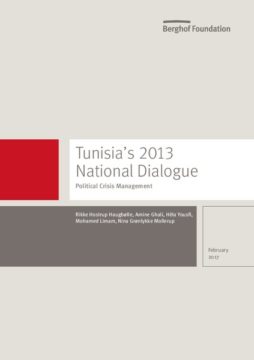On 25 July 2013 the drafting of a new constitution by the Tunisian Constitutional Assembly reached a complete impasse because of the assassination of opposition politician Mohamed Brahmi on that very day. Fears mounted that the fragile democratisation process would come to a halt. In 2011, free and fair elections had brought the Islamist democratic party Ennahda to power, which had formed a government with two smaller opposition parties. Simultaneously, other ‘old’ opposition forces underwent internal reforms and strengthened their position in the new political landscape. Instead of building strong coalitions, these ‘old’ forces revived deep-rooted struggles and disputes. Only in July 2013, at the critical moment, did the political forces realise that they needed to enter into negotiations and dialogue with each other to save the country. The so-called ‘Quartet’ was formed and managed to convince most parties represented in the National Constitutional Assembly to accept their roadmap and begin negotiations focusing on governmental, constitutional and electoral issues. The National Dialogue did not emerge as a carefully designed process, but was rather a response to an acute political crisis. Hence, the Tunisian National Dialogue served as an ad hoc instrument for crisis management, being implemented while the crisis was still unfolding, with many actors engaged at different levels and with several parts of the process taking place at the same time.
- Veröffentlicht am Samstag 11. Januar 2025 von Berghof Foundation
- ISBN: 9783941514294
- 47 Seiten
- Genre: Gesellschaft, Politik, Sachbücher, Wirtschaft
